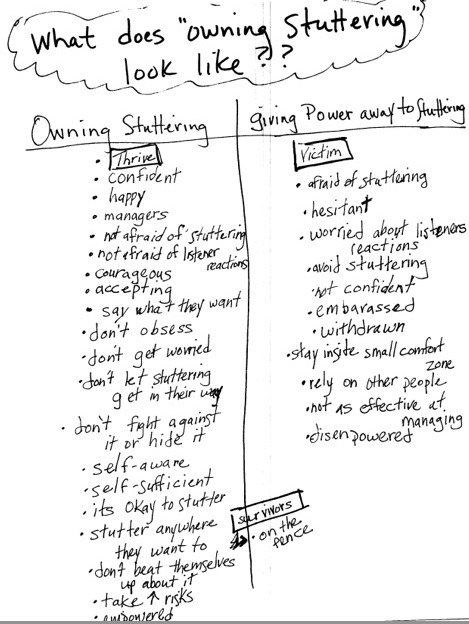Owning My Stuttering!
 |
About the presenter: Nina Reeves, M.S. CCC-SLP is a staff fluency specialists for several school districts near Dallas, Texas. Nina also specializes in providing stuttering therapy services to children and adolescents who stutter in her private practice. Nina presents interactive workshops for speech-language pathologists, early childhood educators, elementary and secondary educators, and parents at the local, state, national and international levels. She has co-authored several publications on the subject of stuttering. |
Owning my Stuttering!
by Nina Reeves
from Texas, USA
In a recent "Kids Talk" section of the National Stuttering Association's publication "Family Voices," a young man described his struggle to learn to "own his stuttering" (see: http://www.westutter.org/opencms/export/sites/default/nsa/pdfs/newsletters/FV_JanFeb_2012_FINAL.pdf). This article spurred me to begin a reflective writing exercise with many of my students who stutter. I asked students (age 11 and up) what it would "look like" if they were able to take more ownership of their stuttering. Their assignment was to reflect on the question and write whatever came to their minds; no editing involved, just honest answers.
As this assignment unfolded, several things surprised me. First of all, I was surprised by the insight these students demonstrated. Their answers were surprisingly mature and well thought out. Each student seemed to come up with thoughts that were individual and based on their own experiences with stuttering. Secondly, the students also surprised me with the depth of the discussions that followed the assignment. The lists became a springboard for further discussions during several therapy sessions. During these discussions, I was able to glean more information about their present cognitive and affective concerns regarding stuttering. I was also able to counsel and guide these children along their journey to acceptance and ownership of stuttering.
Below is a sample of one of my student's lists.
Grayson did a particularly thorough job identifying what positive things could result from his ever-increasing ability to "own his stuttering." Grayson and I had many discussions surrounding this concept. He even took the assignment further to identify the results of "giving power over to stuttering" which he considered the opposite of ownership.
This clinical activity has proven to be valuable for not only my students, but also their PARENTS! I am currently in the process of collecting parent reflections on the same question. I have had several parents tell me they are going through quite a process n order to answer the question of what it means to show ownership of stuttering for a parent of a child who stutters! This will certainly be an interesting process for them, and for me as a clinician to discover "where they are" in their own journey of acceptance.
SUBMITTED: August 1, 2012

